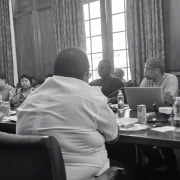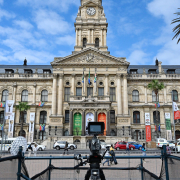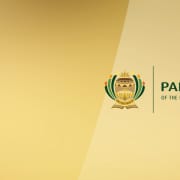|
Getting your Trinity Audio player ready...
|
By Janine Erasmus – CW Voices
Events highlighted in South Africa’s news cycle in the last three months or so have exposed our country’s deep-rooted challenges with corruption, organised crime, and the haunting lack of protection for whistle-blowers who expose criminal activity.
From the revelations of alleged criminal syndicate infiltration into our policing system – initially made by KwaZulu-Natal police commissioner Nhlanhla Mkhwanazi and now finding detailed expression through the Madlanga commission and the parliamentary ad hoc committee – to the recently released interim Special Investigating Unit report on corruption at Tembisa Hospital, a lot has been laid bare about what failures in accountability look like.
The picture of accountability we have as citizens is one of a strong, independent criminal justice system that – when confronted with incidents of corruption – decisively deals with those it finds to be in the wrong, while protecting and supporting the brave individuals who expose that wrongdoing. Our perception of law enforcement agencies relies a lot on their performance and the positive results it yields.
The time has come, however, for us as citizens to evaluate our ability and willingness to play a part in the corruption fight in whichever way we can.
Active citizens
At Corruption Watch (CW) we hold fast to the philosophy that fighting corruption begins with the individual person. To report that corrupt official, to set an example of good ethics for oneself and in one’s own community – that is where it begins. The very refusal to participate in corrupt practices is an important act of defiance.
But for millions of individual citizens, it is a little more challenging, especially when those citizens’ personal circumstances are not conducive to resisting corruption. It is often the case that people must incorporate corrupt activities – or even rely on them – in their day-to-day routines merely to obtain the basic services they are constitutionally entitled to.
We see this time and time again in the reports we receive and the people we speak to, and we know the situation is much more nuanced than it appears on the surface. It is easy to say, “Don’t do corruption!” but this statement fails to take people’s often difficult personal circumstances into account.
So how does the ordinary person take part in the fight against corruption, using the resources available to them?
Citizen participation is a vital component in anti-corruption, because an approach that brings in all sectors of society and that works at all levels is the only one that will work. Not only that, but a well-functioning democracy demands the active and informed participation of citizens in political processes such as elections, development of laws and policies, or holding elected officials accountable. Power resides within us and not with a small elite.
This is what is meant by the ANC’s statement of “the people shall govern”, as defined in the party’s 1955 Freedom Charter.
I am not alone in believing that to make the most of citizen participation in this worthy cause, certain conditions must be in place, including:
- An enabling environment.
- Adequate and free access to information.
- Use of information and communications technology (ICT).
Has our government achieved this? Yes and no. In other words, partly – but in the view of many, including CW, not nearly enough.
Were it not for tireless efforts by civil society organisations (CSOs) and passionate individuals who put relentless pressure on government to uphold its commitments to sanction corrupt behaviour and respect people’s rights to report on and act against corruption, we would be a lot further behind than we currently are.
Civil society has achieved much in the past decade. As a collective, we have won important anti-corruption court battles, contributed to the development of laws and policies, engaged with residents on matters that affect them, empowered communities to hold their municipalities accountable, brought down corrupt companies, and much more.
We can do this because our government is constitutionally obliged to allow personal freedom of association and expression, and a media that is independent and unobstructed. Other countries are not so fortunate.
The many freedoms of our society also allow ordinary people to work together with their community members, work- or schoolmates, and CSOs to fight corruption. They can actively speak out against corruption, help spread educational messages and raise awareness, report corruption, organise civil protests, demand accountability from those accused of corruption, or support whistle-blowers.
These actions don’t need money or fancy resources – they just need outrage at what we as citizens must endure because of corruption, and determination to turn the tide.
Let us now briefly discuss those three conditions mentioned a few paragraphs ago.
Enabling environment
When we speak of an enabling environment, it means that various tools and facilities are readily available to make anti-corruption efforts easier and indeed possible at all levels of society and government. Under the universally binding UN Convention against Corruption (UNCAC), article 13(1) – Participation of society – lays this foundation by providing that states parties to the convention are obliged, through their governments, to “take appropriate measures to promote the active participation of individuals and groups outside the public sector, such as civil society, non-governmental organisations and community-based organisations, in the prevention of and the fight against corruption”.
States parties are countries that have ratified or acceded to the UNCAC. Ratification and accession have the same ultimate effect – the country consents to be legally bound by the treaty’s provisions – although the procedures differ. South Africa is a state party to UNCAC, having ratified the treaty in 2004, and so is bound by its provisions.
Further, article 13(1) instructs governments to ensure transparency in and promote the contribution of the public to decision-making processes, undertake public awareness- and education-raising exercises against corruption including in school and university curricula, and to ensure effective public access to information.
In many cases this has become the job of civil society and the media – which is not to say it’s a bad thing. Collectively we keep up the pressure for transparency and accountability, conduct campaigns that reach not only children or the youth but also vulnerable and marginalised communities, and we encourage people to use the information at their disposal to make informed decisions about matters that affect them.
An enabling environment also means that ordinary people can report corruption through secure channels and be confident that they will suffer no reprisals. Here is one area where government has failed dismally – whistle-blower protection. Some whistle-blowers suffer serious occupational detriment and/or financial challenges – others are harassed and intimidated, or lose their lives. Investigations that should uncover the truth of corruption allegations are turned against whistle-blowers. Laws that should support them are not. Even though those laws are now being overhauled , the process is slow.
Access to information
When citizens can freely access public sector information, they can make informed political decisions based on this information. When they possess the facts on how they are governed and how their government uses their money, they are empowered to participate in setting priorities and making decisions and to hold their governments accountable for its decisions and actions.
Access to information (ATI) underpins democracy and good governance – because information belongs to the people, says Laura Neuman, a senior programme associate at the Atlanta-based Carter Center. “Governments simply hold information in their name. With information, citizens can better secure their democratic rights.”
Furthermore, allowing people to request and receive public documents is a critical tool in the fight against corruption. Transparency is always the name of the game!
The effectiveness of ATI, however, depends not only on providing residents with the ability to access information, but also on government’s willingness to be transparent in granting such requests. It has taken a long fight and years of advocating, but in recent years we have seen an improvement in ATI. The Covid era and its plethora of procurement and other scandals revealed that opacity had to be eliminated and replaced with transparency.
As of April 2023 we have a public register for beneficial ownership information, but it took sustained international action to make that happen. The register allows us to see who is the real owner of a company that, for instance, bids for a juicy government tender and whether it is just a front for a government official who wants to bend the rules and score big.
We at CW have had mixed results in soliciting information under the Promotion of Access to Information Act (PAIA), whose purpose is to ensure the public’s constitutional right of access to any information that they need for the exercise or protection of any right, whether that information is held by the state or another person.
But we believe in the right to know, and this belief is consistent with any list of human rights. It is therefore something we’ll continue to press for.
Use of information and communications technology (ICT)
We come to a critical factor in the corruption fight. ICT allows information to be shared instantly and widely – think of online news platforms or social media, where breaking news is available within minutes.
Of course, we must always be aware that online and social media are also used to spread fake news and disinformation, but that’s another discussion altogether.
As technology advances, new applications are developed, which provide new channels for citizens to report corruption. We have hotlines and dedicated e-mail addresses and WhatsApp channels that connect us to various bodies. We can use our phones to make text or video records of corruption and instantly submit them, with supporting information, to an anti-corruption agency, such as Ghana’s Eye on Corruption app which also works in Mali, Togo, Nigeria, Liberia, and Zimbabwe. Here at CW, we have Veza, our own web-based app for reporting of police corruption and for sharing other relevant police-based information.
Technology also allows us to take part in democratic processes. We can watch Parliament TV all day if we so wish, or follow – live, recorded, or through comments – the president’s important speeches or vote-counting after elections.
Another valuable use of ICT involves the digitisation of government processes and services, which automates such processes and limits human interaction, keeping the discretion of public officials to a minimum and making it more difficult for processes to be manipulated through corruption. The government’s e-Services portal makes over 130 services accessible through a web browser. We can file our taxes online, log service complaints, or apply for an e-visa, and much more.
ICT allows us – CSOs and citizens alike – to use publicly available datasets to detect worrisome trends and patterns which could indicate corruption, and to develop tailored and targeted measures to address them. CW’s Procurement Watch tool aggregates procurement data from National Treasury’s website on deviations (from pre-existing procurement procedures), expansions (of the initial terms of a public contract), and blacklisted suppliers (who have been barred from contracting with the government).
Other digital tools include the Parliamentary Monitoring Group’s ParliMeter, which uses open data sourced from Parliament to empower CSOs and residents to hold their elected representatives accountable, and the Zondo Recommendations Tracker, a tool running under the umbrella of the Civil Society Working Group on State Capture, of which CW is a member.
All these facilities equip us, the ordinary South Africans, to do better when it comes to fighting corruption.
These tools are at our fingertips but will only be truly effective if we use them well – let’s do it!







